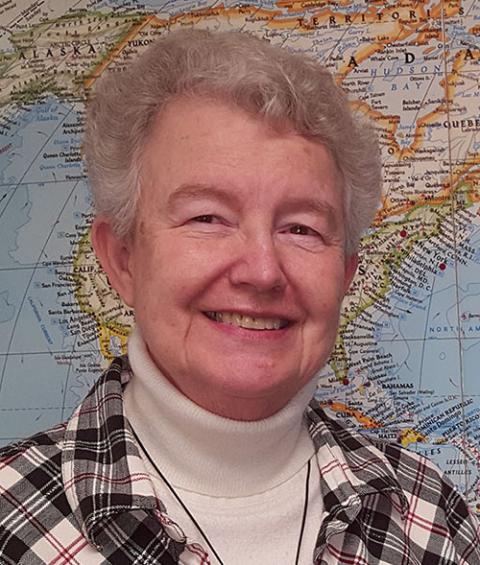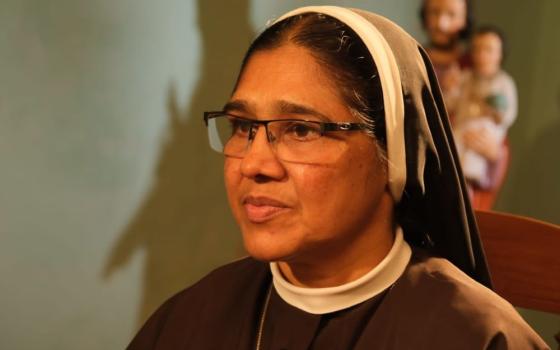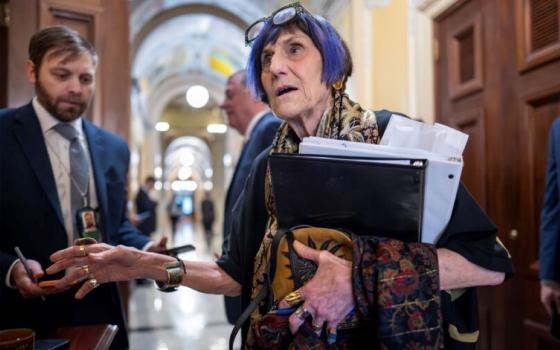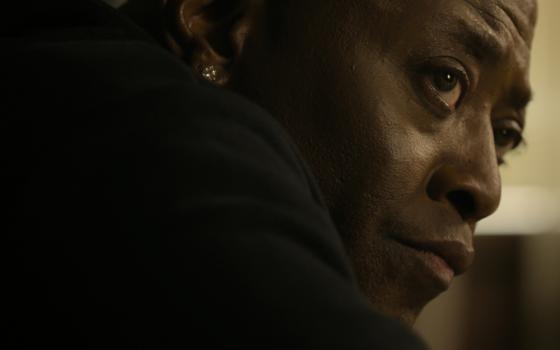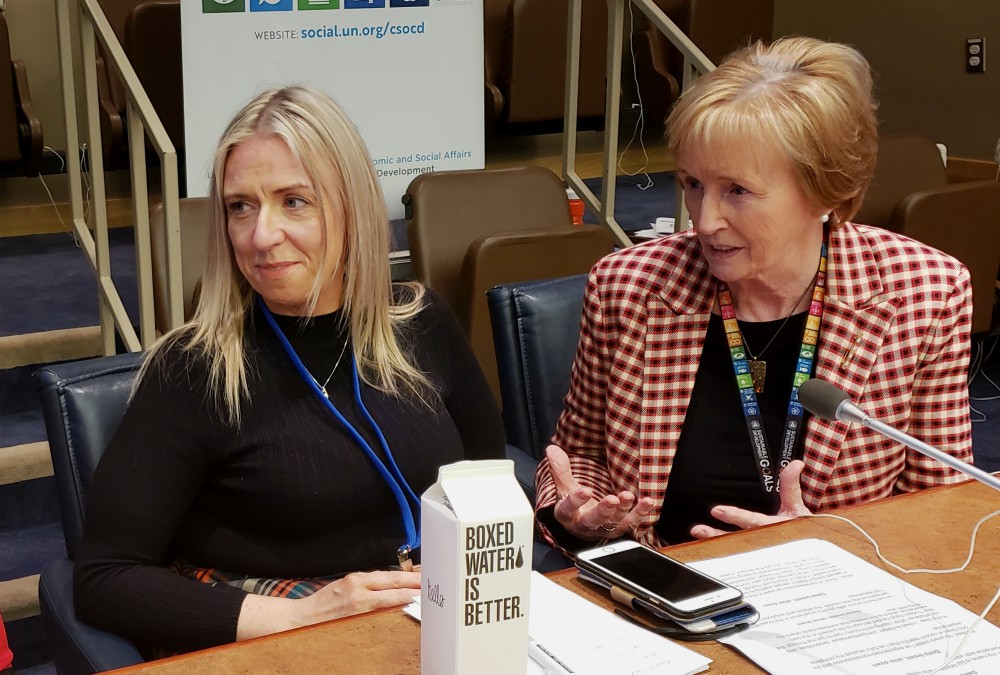
In this 2020 photo, Irish Daughter of Wisdom Sr. Jean Quinn, executive director of UNANIMA, right, and Elizabeth Madden, who is Irish and experienced homelessness more than 20 years ago, during United Nations meetings on homelessness and affordable housing. Throughout her time as UNANIMA director, Quinn said it is important for the U.N. to hear directly from those who experienced homelessness. (GSR photo/Chris Herlinger)
For more than two decades, a prominent sister-led coalition has raised awareness at the United Nations on a host of pressing global issues — most recently on homelessness — and made its mark on deliberations at the world body.
But now the coalition will end its ministry by the end of the year.
UNANIMA International is a coalition of 23 sister congregations that, in its 23-year history, championed causes such as water, homelessness, anti-trafficking, and girls' and women's health. (The name UNANIMA is a combination of "UN," representing the United Nations, and "ANIMA," which derives from the Latin word for feminine "spirit" or "life principle.")
The decision to conclude the coalition's work was painful but felt necessary due to difficulties in finding a new director, and the financial challenges some of the coalition's smaller congregational members are facing, said Sr. Jean Quinn, the group's current director.
"There's a lot of grieving and lamentation, I would say, in terms of coming to terms with endings and what's coming in the future," Quinn told Global Sisters Report, adding that she is still "in that grieving space myself."
Quinn, an Irish Daughter of Wisdom who has headed the coalition since 2017, had already indicated that this year she was retiring from the post. But that decision coincided with a discussion in recent years by the coalition's board about UNANIMA's present needs and possible future.
Advertisement
A discernment process, Quinn said, resulted in a February decision to begin a process of "completion."
UNANIMA International, or UI, "was not merely a collection of initiatives and programs — it was a movement, a force for change, and a testament to the power of collective action," Quinn wrote in a brief June letter announcing the decision.
Up until that announcement, UNANIMA had not formally announced the move, with Quinn preferring to write or speak privately with coalition members, congregations, supporters and friends.
In a March letter to the Leadership Conference of Women Religious, for example, Quinn said that UNANIMA had "indeed fulfilled its founding mission and that now is the time for UI to embrace that fulfillment and come to completion in 2025. ... We are proud that UI demonstrated that, when small communities of women with shared missions work together, they can have a global impact. These realities are UI's legacy."
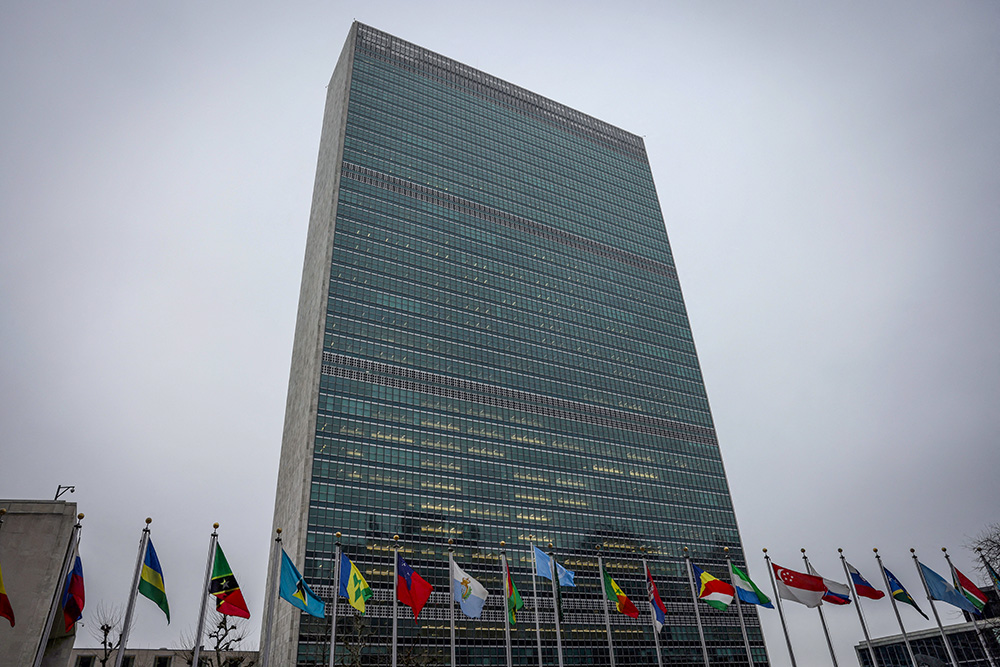
The United Nations headquarters building is pictured in New York City Feb. 23, 2023. (OSV News/Reuters/Mike Segar)
The coalition sought to "occupy spaces of power on behalf of those who can't be present, in order to infuse the conversation with the perspectives, experiences, and needs that would otherwise be absent," as stated on its website.
In representing 25,000 sisters in the member congregations and working in 100 countries, UNANIMA has been one of the most prominent religious coalitions at the United Nations. Quinn, whose ministry in Ireland prior to her work at the U.N. focused on homelessness, became a prominent advocate at the United Nations for the cause of eliminating homelessness.
A major landmark for UNAMINA came in 2020 when advocates on the issue of homelessness and affordable housing (including Catholic sisters and representatives of nongovernmental organizations) saw their efforts come to fruition after years of work.
First, the U.N. spotlighted homelessness and affordable housing during the February meetings of the 46-member Commission for Social Development, held at U.N. headquarters in New York City.
Later, that led to a milestone "outcome" document on homelessness — the U.N.'s first ever — which affirmed many of the concerns on homelessness championed by UNANIMA, Catholic sisters and others at the U.N.
"UNANIMA International is a significant organization with almost 24 groups of women, and groups of friends," Quinn said. "When you're working, you forget the impact you have had on groups, on issues, until it is closed." But, she said, "people are talking about the significance of what we have done."
Quinn said a search group began looking for a possible successor about 18 months ago, and sought a woman religious — but finding a replacement proved difficult. Adding to the challenge were considerations over funding an office at the U.N.
"For some of the smaller groups," she said, "they were finding it harder to come up with finances to keep UNAMINA going," adding that ministry needs in the Global South are now a priority for many congregations.
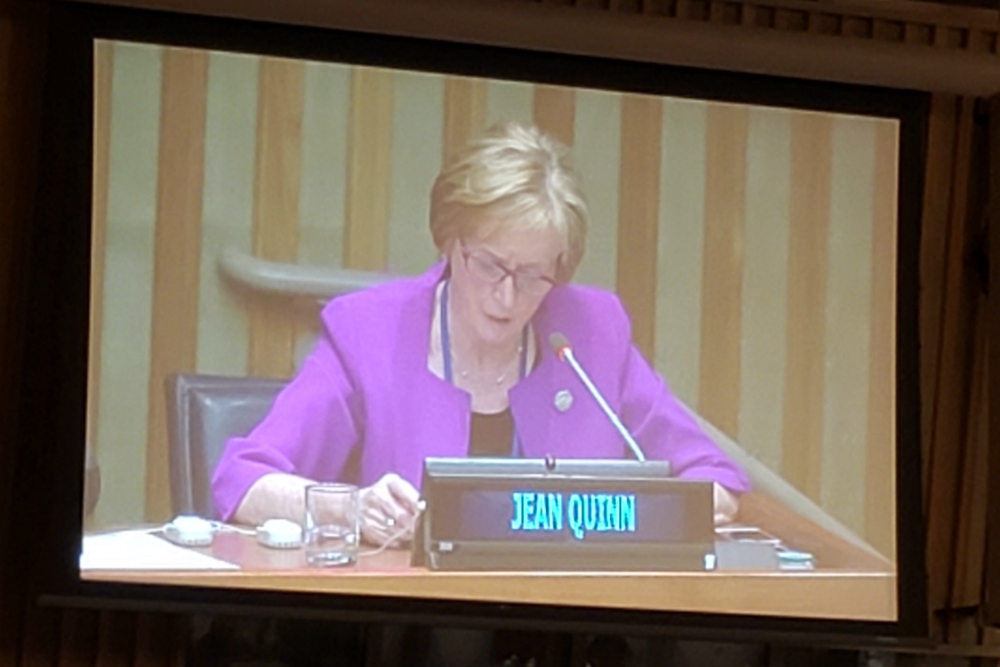
Daughter of Wisdom Sr. Jean Quinn speaks Feb. 10, 2020, at an opening session of the United Nations' Commission on Social Development meeting on homelessness. (GSR photo/Chris Herlinger)
That led to a process of what Quinn called "a very significant discernment," asking the question, "Were we putting off what we would still have to do in two years' time?"
There was also the question of whether "we had done everything we set out to do." She said work in different times on water, trafficking, and in recent years on homelessness proved "significant." Important research on those topics, particularly on homelessness, was done in collaboration with partners such as New York University.
Irish diplomat praises UNAMIMA's work
Such work did not go unnoticed at the United Nations, said Ambassador Fergal Mythen, the permanent representative of Ireland to the U.N.
"UNANIMA has been a truly influential voice at the U.N., tirelessly advocating for women and children, particularly those experiencing poverty and homelessness," Mythen told GSR.
"Its pioneering work on homelessness from a global perspective ... has been effective in encouraging U.N. member states to recognize the link between the [U.N.'s] 2030 Agenda and the global homelessness crisis, as well as the intersectional issues that drive poverty, inequalities and homelessness," Mythen said.
UNANIMA "has also shone a much-needed light on the disproportionate impact of homelessness on women and girls, children, persons with disabilities, and those from minorities and vulnerable groups," he said.
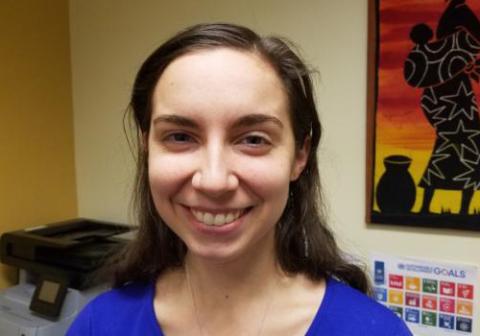
Teresa Blumenstein (GSR photo/Chris Herlinger)
Others also expressed disappointment but said they understood the larger context.
"It definitely feels like a loss," said Teresa Blumenstein, the coordinator of the Justice Coalition of Religious, an advocacy coalition of male and female religious at the U.N.
Blumenstein, who formerly worked as an executive assistant at UNAMINA, said UNAMINA was something of a "model and testing ground" for the Justice Coalition of Religious, and for advocacy in general among sisters at the U.N. She said UNAMINA represented sisters' "overarching spirit of a common mission."
Quinn's immediate predecessor at UNAMINA, Sr. Michele Morek, told GSR that the decision made her nostalgic but that it "reflects the reality of religious life in the U.S. these days," with more congregations moving toward completion with aging members and smaller number of members.
"Many of the congregations who at one time would have been most likely to get engaged in international politics are decreasing either in numbers or energy levels," said Morek, also a former sister liaison for GSR. Or, she said, "their attention may be on issues related to specific countries where they minister."
Still, Morek, an Ursuline Sister of Mount St. Joseph, Kentucky, said that UNANIMA leaves a proud legacy, and that the work of the coalition and of sisters in general "made our mark on the U.N," particularly in the language of the U.N's ambitious Sustainable Development Goals to eliminate global poverty and other social ills.
A former president of the U.N. general assembly once told Morek "that 80% of the language in the SDGs came from civil society, much of it from the religious NGOs," Morek recalled. "Once a word is in U.N. documents, it is considered precedent, and we got ideas into the documents on trafficking, water, climate change and homelessness."
Quinn emphasized that while UNANIMA's ministry is drawing to a close, sister congregations will "continue their advocacy work [at the U.N] through other channels and organizations to ensure their important voice is still heard."
She believes "passionately" that there is a need for a sisters' voice at the U.N. And she thinks such a voice will continue — though possibly in new ways — in the spirit of collaboration that UNANIMA championed.
"I think that's the way forward."

